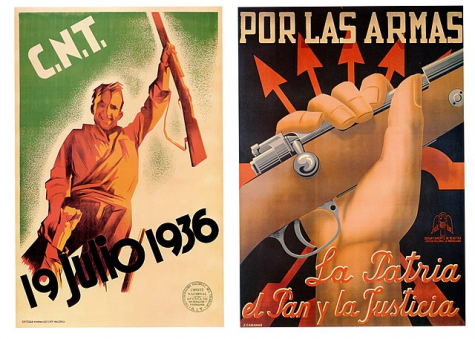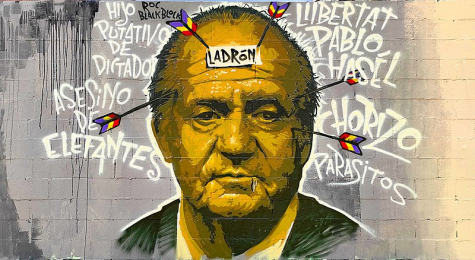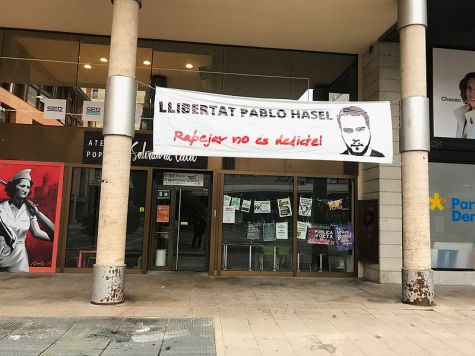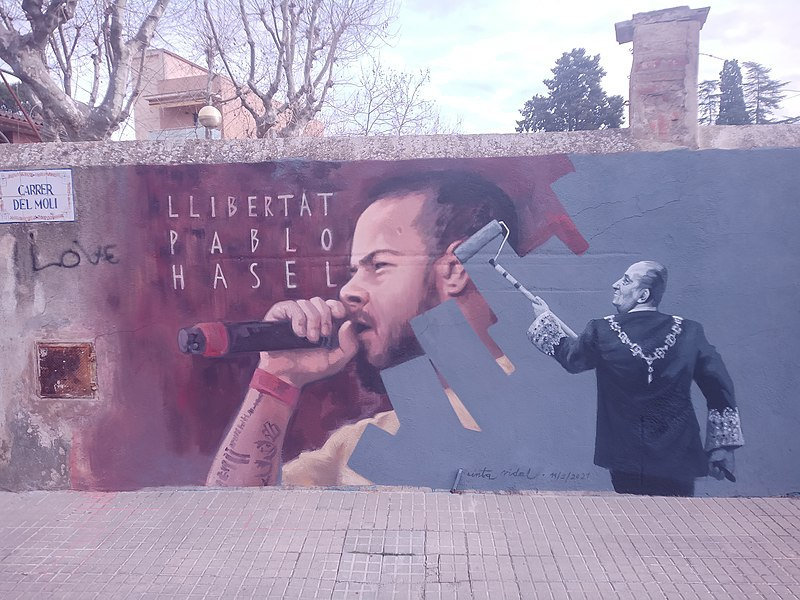Pablo Hasél and the Fight for Freedom
The monarchy in Spain has exercised its power to arrest political rebels for simply exercising their individual freedoms.
A mural in Spain depicts a portrait of Pablo Hasél being painted over by former King Juan Carlos. The mural symbolizes the censoring of Hasél by the monarchy and a wish for his freedom. The text reads “Free Pablo Hasél.”
Spain has a history of political repression that dates back to the Franco regime. For years, Spain has been imprisoning dissidents for simply speaking out against the state. Since February 2021, rampant protests have been occurring in an effort to allow such dissidents to be released, often turning into violent conflicts with the police.
Pablo Hasél, a popular rapper, is a central figure of the ongoing Spanish Protests. His radical politics have gotten him arrested multiple times. Hasél identifies as a Marxist-Leninist communist. The implementation of Marxism Leninism has been attempted throughout history. It is a combination of the theory (written by Karl Marx and Friedrich Engels), and the thoughts of Russian revolutionary Vladimir Lenin.
For Hasél, Marxism Leninism as espoused by Fidel Castro, Che Guevera, Ho Chi Minh, and the Black Panther Party is the only true way to achieve liberation. His politics stem from a history of left-wing struggle against the Spanish crown.

The origins of the left-leaning ideals in Spain date back to the early 20th century. Frustrations about the oppressive nature of the power structures that ruled Spain, such as the church, monarchy, and aristocracy, popularized left-wing ideology.

Various movements rose from the frustrations who adopted the Anarchist ideologies of Anarcho-Syndicalism and Anarcho-Communism. The left continued to grow, eventually toppling the monarchy and establishing a Republic in the early 1930s.
The Republic, while being volatile, was challenged by representatives of the establishment in the form of traditionalists, fascist Falangists, and monarchists. This culminated in the Spanish Civil War where, for three years, left-wing supporters of the Republic and right-wing supporters of the Monarchy clashed ultimately resulting in the establishment of the Franco regime.
The struggle against the establishment continued throughout the Franco regime and manifests itself today in the radical rebellion of figures like Hasél. Today, the Spanish state continues to maintain the monarchy which Hasél speaks out in opposition to in his music.
Oftentimes Hasél’s anger manifests itself in very raw ways in his music. He has one song entitled “Juan Carlos El Bobón” where he is calling the first monarch after the Franco regime dumb. The entire song is a combination of insults against the monarchy as well as a critique of the crown’s corruption. He talks about how the crown benefits while the people suffer and may even benefit from such suffering, the duty for which it exists is not being fulfilled.
A rather striking line from the song is “No soy un súbdito, no me someto apestoso cacique tu trono obsoleto no merece respeto pronto se irá a pique.” In a very passionate way, he declares that he is not a subject or someone to be subdued and proclaims that the throne will soon fall.

(Public Domain)
Hasél’s arrest stems from tweets that the rapper made insulting the royal family and state actors like the police, as well as supporting violent left-wing groups against the state. For this, he has been charged with the glorification of terrorism as well as libel.
Twitter is a platform where thoughts can be both crude and lack nuance, therefore such action simply for making comments on a social media platform is a restriction on the liberal values of freedom of speech.
Apart from Twitter, Hasél does make a nuanced commentary in regard to the oppressive nature of the constitutional monarchy. In one song entitled “Ni Felipe VI,” which means Neither Felipe VI, who is the current monarch, Hasel raps “Vuestra política asesina, combatimos; Sois vosotros quienes enaltecéis terrorismos; Con terror queréis que no digan lo mismo otros.” This roughly translates to, “Against your murderous politics, we fight, you are the ones who exalt terrorism, with terror you want others not to say the same thing.” The state proved his assertion when they arrested him for exercising freedom.
Inspired by his words, thousands across the country have taken to the streets to demonstrate in support of Hasél. Protestors marched across cities holding banners with slogans that said “Free Hasél” or “Liberate Hasél.” Many of these protests became violent, as state actors such as the police became involved in curtailing the marches.

(Davidpar CC BY-SA 4.0)
Political violence as a means of liberation is a controversial topic. There are many who say that it is a necessary part of the struggle, while others regard it as frivolous. On political violence, Tasmia Afrin ’23 said, “I find it very conflicting because usually, the goal is to rebel through revolts in order for a set group to see a transformation of governance. However, innocent bystanders and citizens are always caught in the crossfire. Yet, I still understand it, because things such as looting and protests are a cry for people’s voices and freedoms to be acknowledged. To me, it becomes a problem when it happens constantly with no reforms or intention of trying a more peaceful way.”
Francisco Diaz, a student at the Scholars’ Academy, put it rather succinctly: “In situations where the government’s actions undermine the will of the people, political violence is sometimes a necessary tool to enact change.”
Regardless, Hasél’s situation and the medium through which he conveys his politics have provided an opportunity to fight and bring awareness to what the state is. People, especially vulnerable groups, cannot have liberation and freedom under the current Spanish state.
The ruling class in the constitutional monarchy of Spain manifests its will through its use of the state apparatus. That is why these protests matter, as this is the will of the opposition to the ruling class. Whether or not you agree with the politics of Pablo Hasél, it is quite clear that his rights have been unjustly infringed upon and that such action must be fought against.
The ruling class in the constitutional monarchy of Spain manifests its will through its use of the state apparatus. That is why these protests matter, as this is the will of the opposition to the ruling class.
Rahib Taher is a Copy Chief for 'The Science Survey.' He enjoys journalistic writing as it gives him the liberty to write about topics that interest him....











